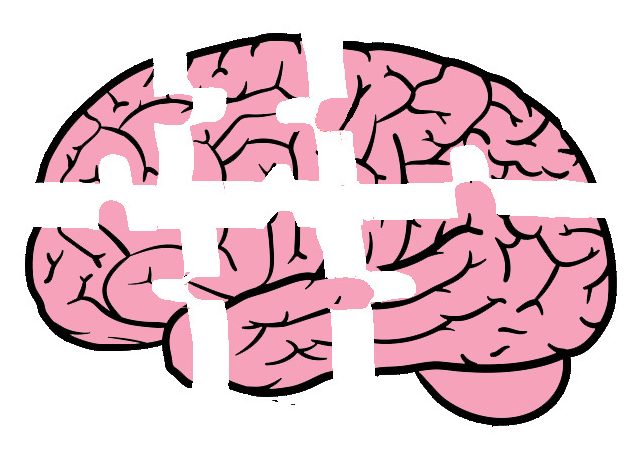Dylan’s Piece of the Puzzle: The brain
Photo illistration by Dylan Cohen
The brain is similar to a puzzle in that it requires all pieces to fit together in order to function properly. Out of the parts of the brain, the frontal lobe is most important for puzzle solving.
Have you ever been so focused and engaged in a puzzle or game that you can’t seem to put your mind on anything else? While spending too much time on any task is usually regarded as time consuming and maladaptive, there are psychological reasons for why puzzles and games are so engaging and are great ways to maintain a healthy and active brain.
Puzzles have been involved in cultures across the world for hundreds of years with the first jigsaw puzzle being made in 1762. Because of their historical significance, puzzles have been a topic of interest for psychology and neuroscience researchers.
The frontal lobe
According to social studies teacher Jennifer Bauer, the frontal lobe is directly involved in puzzle solving. Located in the front of the brain near the forehead, this lobe is responsible for decision making, perception of one’s environment, language formation and other complex cognitive processes. As being an integral part of the brain’s reward system, the frontal lobe is the reason why people can stay glued to puzzles for hours at a time.
Neurotransmitters
Out of the thousands of hormones in the human body, three main brain hormones, or neurotransmitters, are involved in puzzle solving: norepinephrine, serotonin and dopamine.
Serotonin, widely known as the happy hormone, is responsible for the cheerful feeling you get when completing or working on a puzzle. Dopamine is often confused with serotonin as it plays a key role in regulating mood, but unlike serotonin, it is also involved in the brain’s reward system. Completing a puzzle will release dopamine in your brain, activating the reward system and leading you to want to solve more puzzles.
Norepinephrine acts as a stress hormone in the body. While not as happy as dopamine or serotonin, norepinephrine can provide healthy stress associated with productivity and problem solving, two skills that are necessary when solving a puzzle.
Benefits
In addition to being a fun way to spend spare time, puzzle solving provides a wide variety of short-term benefits. The brain is an elastic part of the body, and puzzles enable it to maximize flexibility. With high brain flexibility, performance on mental tasks increases. According to the American Psychological Association, “Research suggests that human brains continuously undergo structural reorganization and functional changes in response to stimulations or training.”
Brain flexibility can provide long-term benefits as well. Memory retention, defined as the ability to retain information over long periods of time, is a prime example of a long-term benefit. Memory retention is particularly beneficial to prevent brain diseases such as dementia. “They’re showing that memory retention can delay Alzheimers,” Bauer said.
Whether it’s doing the daily crossword, working on a sudoku, playing brain games or finishing a jigsaw puzzle, everyone of all ages can enjoy the psychological benefits that come with working on puzzles.
Your donation will support the student journalists of Thomas S. Wootton High School. Your contribution will allow us to purchase equipment and cover our annual website hosting costs.
Dylan is a 2023 graduate.










